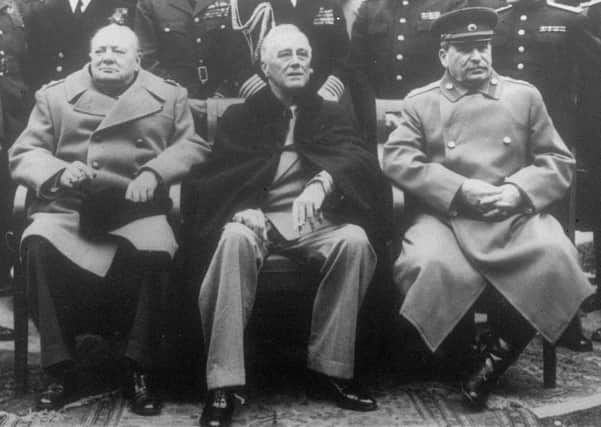It is proper that the countries that defeated Hitler commemorate and celebrate VE Day


The former SDLP MLA Alban Maginness has written an article questioning, almost ridiculing, the VE Day celebrations.
He wrote: “For all of the self-congratulation and chauvinistic chest-puffing that will take place on Friday among the Western Allies, it should be acknowledged that the most decisive factor in the defeat of Hitler was not the British Army, nor indeed the American army’s undoubted successes, but the military success of the Soviet Red Army.”
Advertisement
Hide AdAdvertisement
Hide AdIn the Belfast Telegraph article, Mr Maginness compares the millions of Russian servicemen who died to a much lower British and American death toll.


He wonders if we should still mark VE: “Continued commemoration glorifies militarism and stirs up misplaced nostalgia.”
And he concludes: “Maybe we should ... recognise the terrible tragedy of the Second World War for the catastrophe that it really was and now give it a respectful and dignified burial.”
The reality of the course of the war is different to what he conveys.
Advertisement
Hide AdAdvertisement
Hide AdIn August 1939 Hitler’s foreign minister Von Ribbentrop and Stalin’s Russian counterpart Molotov agreed a non aggression pact. Germany and Russia would carve up eastern Europe between them. Russia got Lithuania, Latvia, Estonia, Finland.
On September 1 1939 Hitler invaded Poland, prompting Britain to declare war on him on September 3 and to soldier on alone until the US joined in December 1941 after the Japanese attack on Pearl Harbour. The Russians meanwhile lifted not a finger to help the Poles.
Then with Operation Barbarossa on June 22 1941 Hitler attacked Russia and Stalin was forced to fight back. This went badly because Russia was fighting sophisticated and experienced German air and armour. That, not the undoubted bravery of Russian rank and file, accounted for the high Russian losses.
Stalingrad was a turning point that owed a great deal to the allied Arctic convoys that braved German defences from 1941 to 1945 bring supplies without which Russians would not have made headway.
Advertisement
Hide AdAdvertisement
Hide AdWhile the Russian peasantry were being decimated in battle with the Germans Stalin had an estimated six million civilians killed within Soviet boundaries.
The notion that the Russians rapid advance at the end to Berlin ended the war is not supported by history.
The abrupt end came because Hitler made the mistake of stripping the Eastern front of troops, armour and aircraft to reinforce the west where the allies, mainly US, were in the Ardennes Bulge.
After hard fighting the allies held out and when weather cleared their superior air power wiped out the Germans in through the wide open eastern door.
Advertisement
Hide AdAdvertisement
Hide AdThere have been attempts to claim that the allied bombing of Dresden was a war crime. The holocaust denier David Irving claims vastly inflated casualties.
Official records put fatalities at 22,700 to 25,000, less than the 30,000 killed in the nearby Flossenburg concentration camp at Dresden. A satellite camp probably provided slave labour for rail marshalling yards of the eastern hub and the industry that were the reason for the raids.
Mr Maginness refers to the “egregious and inhumane destruction of Dresden” but it was not some innocent, stately historic city.
It is proper that nations who defeated Hitler celebrate.
We do not have such a day to commemorate the demise of Soviet communism. Perhaps we should.
Davy Wight, Carrickfergus
—— ——
A message from the Editor:
Advertisement
Hide AdAdvertisement
Hide AdThank you for reading this story on our website. While I have your attention, I also have an important request to make of you.
With the coronavirus lockdown having a major impact on many of our advertisers - and consequently the revenue we receive - we are more reliant than ever on you taking out a digital subscription.
Subscribe to newsletter.co.uk and enjoy unlimited access to the best Northern Ireland and UK news and information online and on our app. With a digital subscription, you can read more than 5 articles, see fewer ads, enjoy faster load times, and get access to exclusive newsletters and content. Visit https://www.newsletter.co.uk/subscriptions now to sign up.
Our journalism costs money and we rely on advertising, print and digital revenues to help to support them. By supporting us, we are able to support you in providing trusted, fact-checked content for this website.
Alistair Bushe
Editor